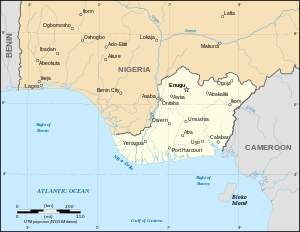| Fall of Enugu | |||||||
|---|---|---|---|---|---|---|---|
| Part of Nigerian Civil War | |||||||
 Map showing the claimed territory of Biafra in June 1967 with key locations including Enugu | |||||||
| |||||||
| Belligerents | |||||||
|
|
| ||||||
| Commanders and leaders | |||||||
| Theophilus Danjuma |
Odumegwu Ojukwu Alexander Madiebo | ||||||
| Strength | |||||||
| 7 battalions |
1 brigade c. 10,000 armed civilians | ||||||
The fall of Enugu was a military conflict between Nigerian and Biafran forces in September and October 1967 during the Nigerian Civil War which centered around Enugu, the capital of the secessionist Republic of Biafra. Nigerian federal forces had made Enugu's capture a priority shortly after war broke out, but their advance stalled at Nsukka. Biafran president and leader Odumegwu Ojukwu, attempted to distract the Nigerian Army by initiating an invasion of Nigeria's Mid-Western Region in August, but the offensive was brought to a halt. Lieutenant Colonel Theophilus Danjuma took charge of the Nigerian forces at the Nsukka front and prepared to advance on Enugu with seven battalions of the 1st Division. Enugu was garrisoned by one brigade led by Colonel Alexander Madiebo and poorly armed civilians called into service. Danjuma decided to launch an offensive with his forces spread over a broad front to make it more difficult for the Biafrans to block them along major roads as had happened up to that point.
The Nigerians began their advance from Nsukka on 12 September. Biafran forces attempted to slow them by counter-attacking and felling trees, but within a few weeks the Nigerian forces had reached Milliken Hill and concentrated their forces. Federal artillery began bombarding Enugu on 26 September, while the Nigerian Air Force conducted raids. Ojukwu pledged to not abandon the city, but the Biafrans began evacuating on 3 October. The Nigerian forces attacked the following day, occupying the city with minimal resistance while Ojukwu narrowly escaped. Many Nigerians hoped that Enugu's capture would convince the Igbos' traditional elite to end their support for secession. While its loss did destabilize the Biafran war effort, Ojukwu relocated his government to Umuahia, and its propaganda concealed the loss of the city, meaning most Biafrans were not aware of Enugu's capture until the end of the war.
